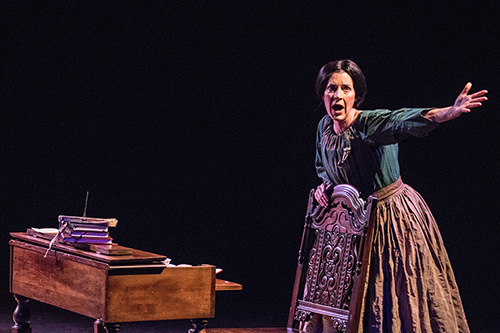by Delaney Meyers

As Kohn described before the show, the libretto is 90% Chesnut’s own words from her meticulous writings about her life as the wife of a Confederate general and Senator during the Civil War, some of which were originally published as A Diary From Dixie. Soprano Andrea Anelli gave new life to these words, setting the scene by singing about those whose stories will and will not be told in history books, and recognizing the exclusion of her own: “I’ll tell the story in my own way,” she sang with a southern twang.

Kohn’s score is a perfect accompaniment to Chestnut’s writing. The music defies easy comparison, but was most closely an intriguing mix between Dvořák and Krzysztof Penderecki. He manages to keep a sound quality reminiscent of “Dixie” melodies and classic American folk tunes, even amidst well-placed dissonances and crunchy chords. The music signaling the beginning of Sherman’s March to The Sea was particularly evocative and chilling.

Much of the opera’s subject matter is still strikingly relevant. The push for smaller, or bigger, government, the fight for equality across differences, the need for increased presence of marginalized voices, etc. Several audience members at the post-show reception shared that they felt very sad afterwards, pointing to the sorrow of so much unnecessary suffering and loss of life. Some, myself included, felt conflicted along with this sadness, because, although typical of Mary Chesnut’s time, it is not easy to listen to the enslavement of African Americans being compared to the “enslavement” of the South to the North, or even to the “enslavement” of women to men.
The opera closes as it begins, with Kohn’s almost Disney-like melody to Chesnut’s line, “I’ll tell the story in my own way.” It felt like the emotional journey had come full circle. Anelli’s haunted look at the closing chord engendered sympathy for her character, though it was difficult to empathize with the South.
However, it became clear through this uniquely personal account that very few were spared the horror of this war. As the fighting is finally ending, after heavy losses on both sides, Anelli delivers the painfully relevant takeaway line, “War is a game of chess played by children dressed like generals.”
Published on ClevelandClassical.com June 28, 2018.
Click here for a printable copy of this article



